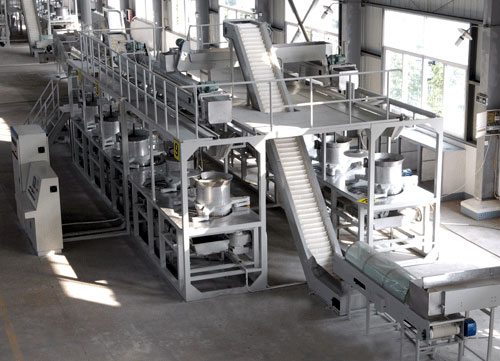Project Report For Mini Tea Factory
Introduction
Project Report For Mini Tea Factory is as Follows.
A micro tea factory is a small-scale tea processing and manufacturing operation. Small tea producers or businesses that want to produce tea on a lesser scale generally utilise it. The small tea factory is a compact and cost-effective method for converting tea leaves into various tea products. The picking of tea leaves from tea bushes is the first stage in a micro tea factory. These leaves are handpicked with care to ensure that only the young and sensitive leaves and buds are chosen. The gathered leaves are delivered to the facility for further processing.
Tea leaves are often processed in various steps in a tiny tea factory. The leaves are first wilted, then spread out and subjected to temperature and humidity regulated settings to minimise moisture content. This withering process makes the leaves more flexible and malleable for subsequent processing.
The rolling stage occurs after the leaves have withered. The leaves are rolled and crushed at this stage to break down the cell structure and release enzymes that commence oxidation. The amount of oxidation affects whether the tea is black, green, or oolong. Depending on the desired tea type, the rolled leaves are subsequently exposed to oxidation or non-oxidation methods. The leaves are then dried or fired to stop the oxidation process and reduce moisture content.
The drying procedure is critical for keeping the tea’s flavour, fragrance, and quality. Different varieties of tea need different drying procedures, such as sun drying, oven drying, or hot air drying. After the tea leaves have dried sufficiently, they are sorted and graded based on size, shape, and quality. This sorting procedure separates the tea leaves into distinct classes, which may then be utilised in different tea products or sold to different purchasers.

Process Of Mini Tea Factory
Natural Wrinkling: Fresh tea leaves are stretched out in thin layers on tat stakes planted one above the other and dried in the open air for at least 20 hours. Man-Made Withering On a mesh, the leaves are put out in layers up to 20cm deep. The meshes are arranged in a tunnel through which warm and fresh air is pumped. This significantly decreases the overall withering time. Withered green leaves with 60-62% residual moisture are appropriate for tea preparation.
Rolling: A round table with a cone in the centre and slats called battens running across the surface. On top of the table is a jacket, or bottomless circular box with a pressure cap. The table and jacket spin eccentrically in opposite directions, and the leaf is twisted and rolled over the cone and battens in a manner similar to land rolling.
Drying: The process of drying on a conventional drier. To effectively inactivate the polyphenol oxidise enzyme, hot air up to 90 degrees Celsius is blasted against the leaves, which should have reached 80 degrees Celsius by the time drying is done. The moisture level should be lowered to 3.5% to allow the perfume to develop and the leaves to take on their characteristic black colour.
Market Potential Of Mini Tea Factory
In 2023, the worldwide tea processing unit market is anticipated to be worth US$ 12.8 billion. Furthermore, with rising global consumption of various varieties of tea, the overall demand for tea processing unit is expected to rise at a 6.4% CAGR between 2023 and 2033, achieving a valuation of US$ 25.4 billion by the end of 2033.
The global tea business has experienced significant expansion, with an increasing number of consumers worldwide. It has become one of the favourite beverages of health-conscious customers since it is considered that drinking tea may provide several health advantages, ranging from anti-inflammatory to antioxidant and weight reduction effects.
Rising worldwide tea production and consumption is a significant driver driving growth in the global tea processing equipment market, and this trend is expected to continue throughout the projected period. greater automation by tea production enterprises will promote tea processing equipment sales. Teas come in a broad range of flavours, and tea companies all over the world are always releasing new ones. As a result, producers have found it increasingly difficult to produce various types of tea.
Project Report Sample On Mini Tea Factory
Need Help?
Create 100% Bankable Project Report
